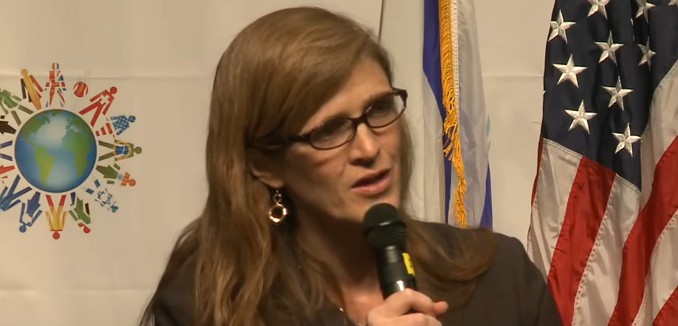U.S. Ambassador to the United Nations Samantha Power blasted the UN on Monday for its systemic prejudice against Israel, saying that “bias has extended well beyond Israel as a country [to] Israel as an idea.”
Speaking before a model UN at a school in Even Yehuda in Israel, Power pointed out that “Israel is just not treated like other countries.” Power noted that the organization ZAKA, which tends to those injured and killed in terror attacks, was consistently denied accreditation by the UN.
Power was especially critical of the behavior of the UN Human Rights Council:
As you all know, the UN Charter guarantees “the equal rights of nations large and small,” and yet we have seen member states seek to use the UN Security Council, the General Assembly, and even the most arcane UN committees in ways that cross the line from legitimate criticisms of Israel’s policies to attempts to delegitimize the state of Israel itself. The only country in the world with a standing agenda item at the Human Rights Council is not North Korea, a totalitarian state that is currently holding an estimated 100,000 people in gulags; not Syria, which has gassed its people – lots of them. It is Israel.
Bias has extended well beyond Israel as a country, Israel as an idea – it even extends to Israeli organizations. Some of you may know the group ZAKA – an Israeli humanitarian group that helps save lives in disasters and ensures proper burial for the victims of those tragedies. ZAKA not only works here in Israel, but it responds to natural and manmade disasters worldwide, as it did in New York after 9/11, and in Haiti after the 2010 earthquake. Yet when ZAKA was nominated in 2013 for accreditation by the UN’s NGO committee – and this accreditation is what gives NGOs the right to participate in UN meetings, the right to assert their voices, the right to raise causes that really can matter in the world – when ZAKA was put forward it was denied approval. Five subsequent times the committee met, and five times member states blocked ZAKA – not because of the quality of its work, people weren’t that interested in the quality of its work, but simply because ZAKA is an Israeli organization.
Power spoke of the importance of fighting the anti-Israel bias “because we recognize that any bias at the UN, where one state gets treated differently – whether it’s against a nation, a religion, or a human being because of who he or she loves, another very common bias at the UN – any bias actually ends up undermining the legitimacy of the UN itself – the principles of equality and non-discrimination that it needs to stand for.”
Toward that end, she recounted how she and the Israeli UN mission worked the phones and contacted diplomats, urging them to accredit ZAKA. In the end, the cajoling worked, and ZAKA received accreditation a few weeks ago.
Power also said that the UN could become a partner in the fight against anti-Semitism.
That is why it is so critical that we work to make the UN also an ally in combating anti-Semitism, particularly in a climate of rising attacks around the world. For some of you in this audience, this issue is deeply personal. Some seniors out there may know Lea Chocron who was up here minutes ago, who played a leading role in your model UN a few years ago.
Lea and her family lived in Paris until she was nine, when they moved to London so her father could take a job. It was while abroad that they started to hear of more attacks on Jews back in France. It started when two of Lea’s friends, both just 11-years-old at the time, were called “dirty Jews” and beaten on the Paris metro. More incidents followed. Their neighbors from Paris told them of anti-Israel rallies where anti-Semitic chants were shouted, and of synagogues being defaced. When the family visited France for a bar mitzvah, Lea’s father no longer wore his kippah outside of synagogue, carrying it instead in an unmarked bag. After several years in London, when the opportunity arose for Lea’s family to move back to Paris – the city that had long been their home – they decided to move to Israel instead.
It is because of rising anti-Semitism that the United States worked with Israel, the European Union, and Canada to organize the first-ever UN meeting on anti-Semitism last year, pressing countries to come with concrete pledges to confront the problem. In the same assembly chamber where, 40 years earlier, the General Assembly had adopted the infamous resolution declaring “Zionism is racism,” that same assembly hall, more than 50 countries committed to taking steps to stop anti-Semitism, such as appointing a special envoy to counter anti-Semitism’s spread.
Power acknowledged that changing the entrenched bias would be “extremely challenging” and indicated that it would take a lot of work and a lot of time to change it.
Told stories of brave Arab & Jewish youth in Israel taking steps to put selves in shoes of others; model for their communities & world
— Samantha Power (@AmbassadorPower) February 15, 2016
A video of Power’s remarks and the question and answer session is embedded below.
[Photo: U.S. Embassy Tel Aviv / YouTube ]




